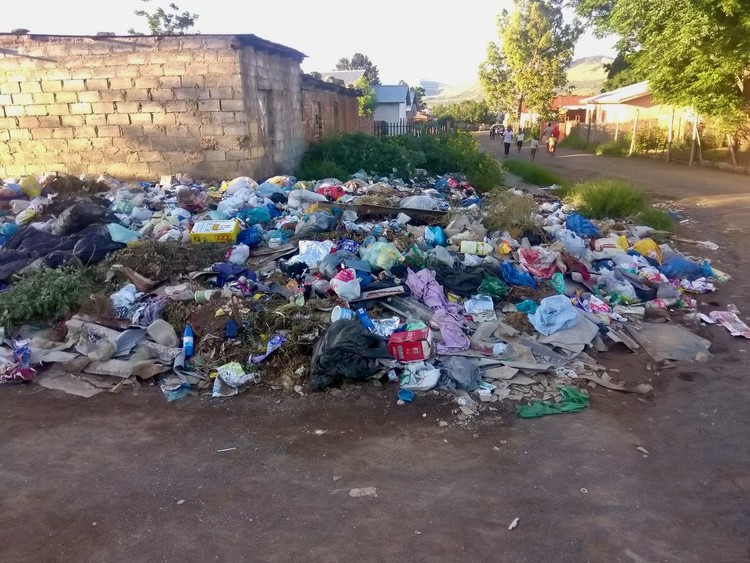Three years after a court order, illegal dumps in Makhanda have not been cleared
There has been only partial compliance by the municipality, while numerous dumpsites continue to plague residents
This illegal dumpsite in Extension 6 in Makhanda has been around for years. Photos: Loyiso Dyongman
For the third year, the Makana Municipality has not obeyed a High Court order to clean up illegal dumpsites in Makhanda, Eastern Cape.
GroundUp went around the town this week – to Tantyi, Fingo, Joza and Extension 6 – and saw plenty of illegal dumpsites.
In 2020 Makhanda residents and Mary Waters High School took the municipality to court for failing to clear illegal dumps. In 2021, the Grahamstown High Court ordered the municipality to clean up seven listed sites within 14 days, identify all other illegal dumps and clear these within 120 days. In the comprehensive order, the court gave the municipality eight months to review its by-laws and waste management plans to ensure it complied with the National Environment Management Waste Act.
The municipality told us it had identified 117 sites and it was complying.
But a month later, it was clear the court order had already been breached, with the municipality having cleared only three of the seven listed sites. The council speaker told us: “We are going to fix that problem.”
By February 2022, the Legal Resources Centre (LRC) was once again threatening court action.
In November 2022, we reported that the municipality had failed to fix its sanitation problems. In an affidavit, the municipality said it had “taken the necessary steps under the circumstances to comply with the court order”.
Now, 18 months later, LRC attorney Cameron McConnachie said illegal dump sites persist. “The LRC will continue to engage the municipality until there is full compliance, and hopes that further litigation will not be necessary,” he said.
The Ezihagwini Street Committee and Mary Waters High School say the illegal dumpsites must get cleared, refuse bins and bags provided, and refuse collected regularly.
“The last time I saw the truck here was last year,” said Fumanekile Seti, of eNkanini. “We don’t even get plastic refuse bags here in the informal settlements. When they don’t come to collect rubbish and don’t supply residents with bags, what do you expect then?”
Residents say the municipality should provide skips where residents can drop their refuse.
Sinoyolo Matwa, from Extension 6, said, “The municipality only grades [flattens with a bulldozer] the illegal dumpsites. The next day residents will throw rubbish there as there is no municipal container available.”
Municipal spokesperson Yoliswa Ramokolo did not respond to questions sent on Monday.
An illegal dumpsite next to homes in Fingo village.
Support independent journalism
Donate using Payfast

Don't miss out on the latest news
We respect your privacy, and promise we won't spam you.
Next: Thousands of children with disabilities are not receiving the Care Dependency Grant
Previous: Cape Town protesters block busy road, demanding services
Letters
Dear Editor
Thanks GroundUp. You have hit it again. Makhanda needs you. We have a vibrant civil society here, which really helps to keep this city in a fairly decent state. The municipality is dysfunctional and civil society could actually do better with the monies they receive from national treasury, rates and services.
River Rescue was cleaning up near Mary Waters High School last weekend. The schools in the area are out regularly cleaning up due to poor municipal service. My school has been sampling river water, which shows severe contamination by human faeces due to water treatment works failure on the Bloukrans River. This is now affecting Port Alfred water quality. Makhanda Municipality could be taken to task at court on numerous fronts related to waste and pollution but the moving of the High Court to Bhisho is reducing civil society's ability to hold government accountable.
© 2024 GroundUp. This article is licensed under a Creative Commons Attribution-NoDerivatives 4.0 International License.
You may republish this article, so long as you credit the authors and GroundUp, and do not change the text. Please include a link back to the original article.
We put an invisible pixel in the article so that we can count traffic to republishers. All analytics tools are solely on our servers. We do not give our logs to any third party. Logs are deleted after two weeks. We do not use any IP address identifying information except to count regional traffic. We are solely interested in counting hits, not tracking users. If you republish, please do not delete the invisible pixel.


